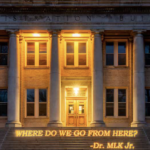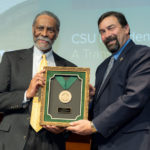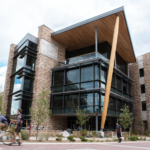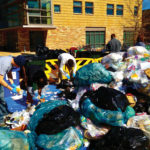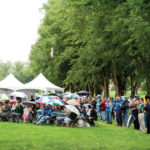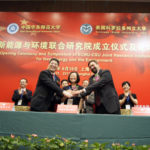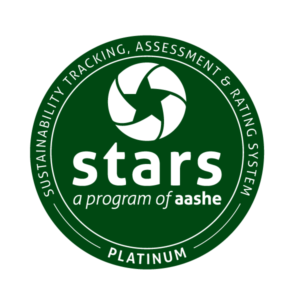 At Colorado State University, sustainability is a long-standing priority, as evidenced in part by the university’s ranking as a Platinum Bicycle-Friendly University by the League of American Bicyclists and membership in the Green College Honor Roll. CSU became the first institution in the world to earn a Platinum rating (the highest possible) through Sustainability Tracking Assessment and Rating System (STARS) in 2015 and repeated this feat in 2017. This fall, the university’s STARS report will be submitted by a group that exemplifies CSU’s commitment to protecting and stewarding our natural world: the President’s Sustainability Commission (PSC).
At Colorado State University, sustainability is a long-standing priority, as evidenced in part by the university’s ranking as a Platinum Bicycle-Friendly University by the League of American Bicyclists and membership in the Green College Honor Roll. CSU became the first institution in the world to earn a Platinum rating (the highest possible) through Sustainability Tracking Assessment and Rating System (STARS) in 2015 and repeated this feat in 2017. This fall, the university’s STARS report will be submitted by a group that exemplifies CSU’s commitment to protecting and stewarding our natural world: the President’s Sustainability Commission (PSC).
The PSC was established in 2017 with the specific charge to “promote and facilitate the effective integration of sustainability across all aspects of the University.” Comprised of staff and student representatives from each college, division, and major sustainability group on campus, the PSC provides the President and Executive Leadership Team (ELT) with perspectives on sustainability from environmental, economic, and social justice lenses. Lynn Johnson, the Vice President of University Operations, serves as the liaison to the President’s ELT. Carol Dollard of Facilities Management and Tonie Miyamoto of Housing & Dining Services serve as Co-Chairs.
“I’m incredibly proud of the work the PSC does with a group of volunteers across the campus community,” says Dollard.
The PSC advocates for sustainability across campus while empowering members of the campus community to pursue new ideas that advance sustainability. Members also advise on university-wide sustainability initiatives, help connect sustainability efforts across campus, report the Campus Greenhouse Gas Inventory yearly, and update the Climate Action Plan bi-annually. Additionally, they utilize STARS to measure CSU’s sustainability progress and maintain a University-wide Sustainability Strategic Plan.
By connecting students, staff and faculty from across campus, the PSC facilitates collaboration and provides a platform for the campus community to propose new sustainability initiatives and address sustainability concerns. One example of a PSC initiative is the pollinator project, initiated when a student expressed concern about the effect of dandelion removal on local bee populations. The PSC charged a sub-committee, Pollinator Friendly Campus Committee with developing solutions to this concern. The result? CSU is now certified as a Bee Campus USA and beehives and plantings that support pollinators flourish across campus.
“What I appreciate most about PSC is seeing students, faculty, staff, and administrators gathered around one table to share ideas, explore new initiatives, and tackle our most pressing sustainability challenges together,” Miyamoto says.
The PSC will play a key role in CSU’s pursuit of the University Climate Action Plan (CAP) goal of carbon neutrality by 2050 and 100% renewable energy by 2030. Adopted in 2010 with this goal in mind, the CAP outlines strategies to guide CSU to a 75% reduction in net carbon emissions by 2030 and 100% by 2050. With the help and guidance of the PSC, the University is well on its way to meeting these goals.
For more information on the PSC at CSU check out their website.

























